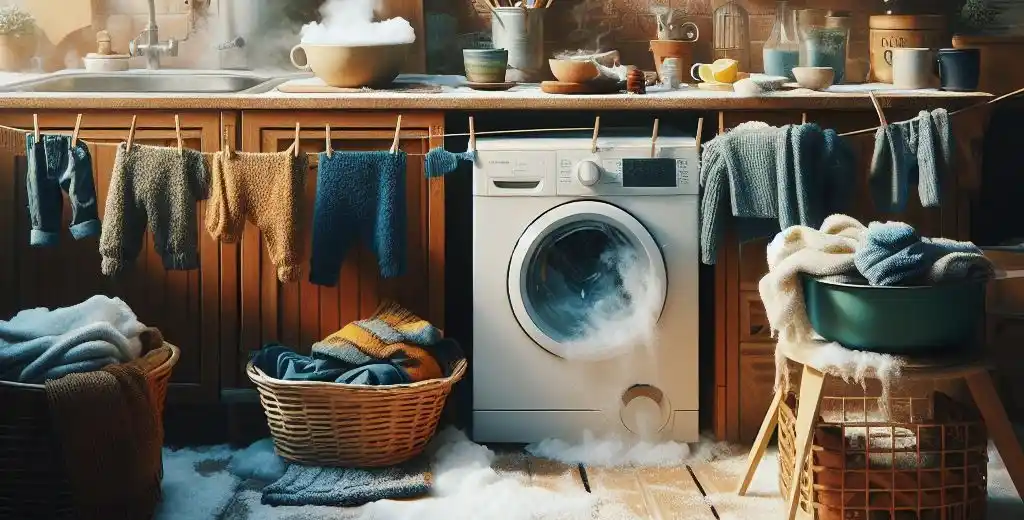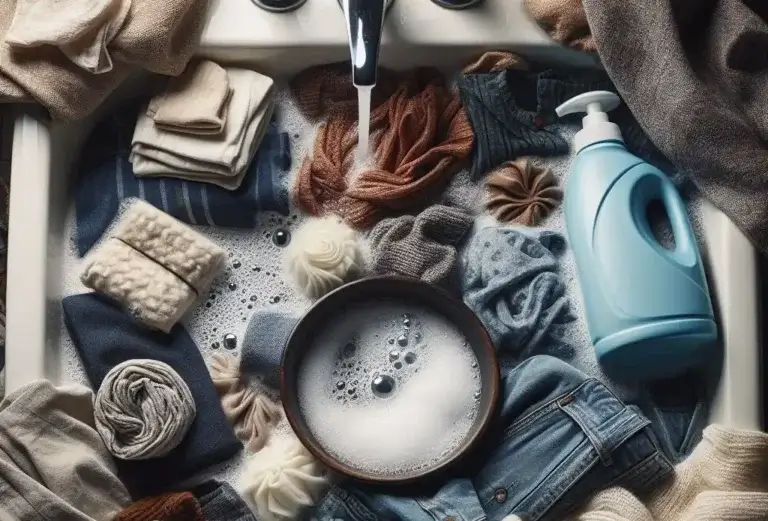Can You Wash Clothes When It’s Below Freezing? Extreme Cold Weather Affects Your Appliances in Freezing Weather
It’s a cold winter day and you come down with a load of laundry only to find ice instead of water coming out of the tapsIn freezing temperatures, water temperature in the washing machine may cause the water intake valve to break. Or maybe you happily put a wash on to find water everywhere because the pipes have burst. So it begs the question – when it’s cold outside, can you use your washing machine and dryer? Or should you avoid doing laundry altogether when it’s extremely cold?
Regular winter weather generally isn’t cold enough to cause huge issues with running your washing machine or tumble dryer. However, during periods of more extreme cold temperatures, you do need to take some extra precautions with your laundry appliances to prevent damage. In this article, we’ll explore can you wash clothes when it’s below freezing and how freezing temperatures can impact washers, dryers, and laundry, plus provide tips on safely using them even when it’s below zero outside.
Table of Contents
How Does Freezing Cold Weather Affect Washing Machines and Dryers?

When the temperature drops below freezing, your home appliances become more vulnerable to damage from the cold. Here’s an overview of how your laundry duo – the washer and dryer – can be impacted when temperatures plummet:
Washing Machine Issues in Freezing Weather
The water lines and water valves that supply your washing machine are prone to freezing. Once the water in your home’s pipes or your washing machine’s hoses freezes and expands, it can cause those water lines to burst. This can lead to water leaks, flooding, and even extensive water damage to your home.
If the washer’s external water hoses freeze, you may turn on your machine to find water skips through cycles or ice comes out rather than actual water. This stops your appliance from effectively washing loads. Frozen internal water lines or valves pose even bigger problems. As well as stopping water flow, the frozen water inside can expand with pressure and crack plastic valves.
This causes them to leak continuously even after temperatures rise above freezing again. Certainly, in freezing temps, replacing broken washing machine valves or water lines is an inconvenient home repair cost better prevented during winter.
Dryer Problems in Freezing Conditions
Your clothes dryer may seem safe from old man winter’s freezing grasp, especially because it generates heat internally. However, plummeting external temperatures can still cause a few potential issues:
- Dryer vents can ice over which blocks escaping moist air. This moist air then turns to condensation inside the dryer, leading to rust and component damage over time, especially when left vulnerable to cold.
- In very cold temperatures, dryers may struggle to reach their highest heat settings. This leaves your laundry not drying fully.
- Blockages from condensed water or accumulated ice can cause waste air backflow. This drops drying efficiency.
- Built-up ice or condensation also leads to premature wear on certain dryer parts. For example, the drum rollers and blower fan.
- Flammable lint trapped inside combined with restricted air circulation increases fire hazard.
So while dryers avoid pipe burst risks, their venting systems and internal parts still deserve protection from the biting cold.
Key Takeaway: Freezing weather puts household water lines at high risk of bursting. This can cut off your washing machine’s water supply and cause internal valve cracks. Dryer vents also get blocked more easily, restricting air circulation and drying power.
Can You Use a Washing Machine When It’s Below Freezing?

Knowing how low temperatures impact your washers and dryers, is it still safe to use them, especially for laundry in freezing temperatures, when outdoor readings drop below zero?
The short answer is yes, you can still do laundry despite freezing conditions. However, there are some best practices you should follow to lower your risk of appliance damage and do laundry as efficiently as possible.
Protect Water Pipes from Freezing
Safeguarding the pipes that feed water to your washing machine needs to become priority number one. Insulate both indoor and outdoor pipes near or connected to your washer:
- For outdoor hose bibs/faucets, shut off your home’s main water supply and drain any remaining water from the lines. Detach hoses when freezing outside to prevent the water intake valve from breaking.
- Cover spigots with insulating foam covers made specifically for hose bibs to keep them safe during freezing temps.
- For constantly connected indoor hoses or supply lines, wrap the water pipes with specific washing machine pipe insulation. Self-sealing sleeve foam is easiest.
- Similarly, insulate household water pipes in unheated areas like the garage or basement using pipe sleeve insulation.
- Allow indoor faucets to drip during extreme cold to prevent freezing.
- Consider electric heat tape or wraps that maintain above-freezing temps.
- For extreme sub-zero temperatures, shut off the main valve and drain all pipes.
These freezing prevention methods help ensure continued water flow to your washing machine despite plummeting temperatures outside.
Alter Your Laundry Appliance Use
Alongside insulating water lines, adjusting how you operate your washer and dryer provides added winter protection:
Washing Machine Precautions
- Only wash full loads or use a smaller load setting. The extra heat from larger loads helps prevent hoses from freezing.
- Run hot water through the machine’s hoses before starting a cycle. This clears any icy build-up in your basement or garage.
- Consider a quick-connect adapter to easily detach frozen outdoor hoses.
- Install your washing machine against a heated indoor wall rather than external walls.
- For top-loaders with a frozen lid or nozzle, pour warm water over the affected area to loosen built-up ice before adding clothes.
- Insulate the washing machine’s external water hoses too using foam pipe insulation.
- Check washers for leaks after use as cracked valves may only reveal issues while water flows.
Dryer Vent Precautions
- Clear your dryer vent ducting of snow buildup outside before running a load.
- Use vent cleaning brushes or vacuum attachments to remove lint buildup inside the ducts to maximize airflow.
- Check the outdoor vent flap opens fully and isn’t stuck shut by ice after each load.
- For electric dryers, use the warmest temperature setting items can handle to prevent under-drying.
- Leave the dryer door open between loads to allow moisture to evaporate and prevent rust inside the drum.
- Prevent condensed water from dripping back down the ducts by angling vent pipes slightly downwards as they exit your home.
- Install dryer vent insulation sleeves if very cold air travels through unheated spaces before venting outside.
Tip: Hang an ice maker in the basement or garage. indoor drying rack close to a heating source. Use this to finish thicker items struggling to dry fully in the dryer alone during cold snaps.
Answering Common Freezing Weather Laundry Questions
Doing laundry when temperatures dive below zero likely raises some questions if you’ve never tackled wash loads in the cold before. So let’s summarize some key points about freezing laundry:
Should I still wash clothes in cold water during winter?
Yes, still prioritize washing with cold water wherever possible. The energy savings are just as worthwhile in winter with rising utility bills.
Modern detergents clean just as effectively in cold water too, so you can safely do laundry in freezing temperatures. Simply allow the wash cycle to run longer for heavily soiled items.
Is it cheaper to dry clothes outside rather than using the tumble dryer?
Drying laundry on outdoor lines or racks is impractical when it’s freezing. However, a vented indoor rack in the garage or basement can effectively dry some items for free if space allows.
Just avoid leaving laundry outside so wet fabrics don’t freeze solid. Finish thick items on a dryer’s delicates cycle afterward if needed.
Should I drain my washing machine between uses in winter?
Draining out the remaining water after the final rinse stops unused water from stagnating inside any external hose coils or internal pipes if temperatures drop below freezing. This minimizes ice blockages and burst risks.
So yes, the best practice is to additionally run an extra spin-only cycle. Manually drain any leftover water too if your machine doesn’t do this automatically.
Can I hang clothes outside in freezing weather?
Leaving washed clothes outside in below-zero temperatures is an absolute no!
Even spin-dried fabrics contain enough moisture to freeze solid rather than dry if left on outdoor lines. This leaves laundry stiff and frosted over with sheets of embedded ice you must chisel off.
Frozen clothing can feel crusty, need rewashing, and may not return to normal softness once thawed. Not to mention you battle carrying rigid icy clothes back indoors without snapping the line!
Conclusion – Can You Wash Clothes When It’s Below Freezing
In most cases, plummeting temperatures outside only require a few adjustments allowing safe laundry use indoors. Simple preventative measures like insulating water lines, venting dryers adequately, and running full loads make operating washing machines and dryers possible even in below-freezing conditions.
While extreme cold increases the risk of burst pipes, frozen valves, and condensation issues, preparation and extra vigilance provide protection. Monitoring appliances closely, following winter-specific operating guidelines, and proactively maintaining both washers and dryers reduces damage risks.
Adjusting laundry habits to cope with the cold does require some extra effort. But winterizing efforts like covering taps, clearing vents, opening doors and frequently inspecting for leaks pay off.
Taking appropriate precautions tailored to freezing conditions lets you continue keeping your family’s wardrobe clean all winter long. No need to let piles of dirty clothes build-up just because the weather outside means Old Man Winter showed up!
Key Tips to Remember
- Insulate water pipes and washer hoses
- Only run full wash loads
- Check dryer vents don’t get blocked
- To prevent fire hazards, ensure to vent dryers adequately, especially when using the dryer in freezing temperatures.
- After use, especially in freezing temps, drain washers.
- Never hang laundry outside to freeze








